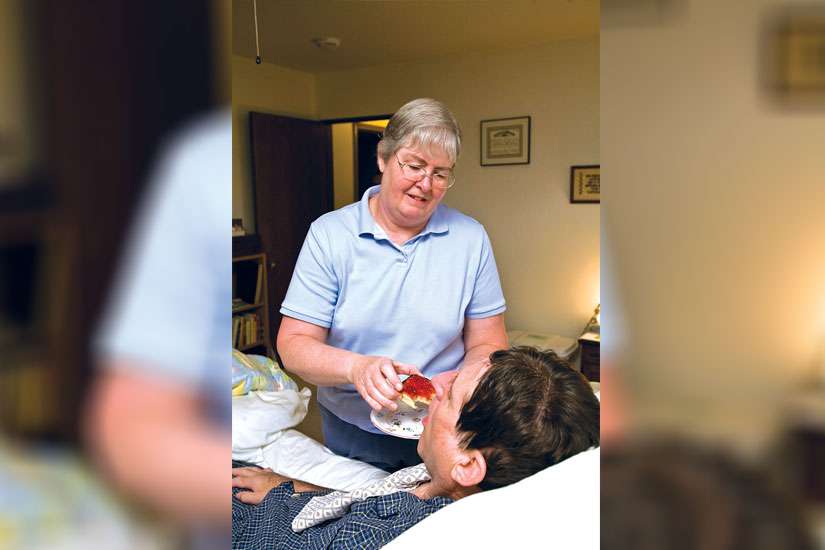As The Catholic Register went to press, the Supreme Court of Canada announced it would release its decision on the Carter assisted suicide case on Feb. 6. Canada’s top court was asked for an opinion on a B.C. court decision that ruled physician-assisted suicide contravened a person’s constitutional rights and should therefore be made legal.
“This is the make-or-break year when we may be suddenly living in a country where we allow doctors to take the lives of their patients,” said Charlie Lewis, a former reporter for the National Post and anti-euthanasia crusader. “Of all the social issues, this is one that we don’t have yet — and it is going to take a monumental effort” to stop it.
Lewis has been volunteering his time since leaving the Post to give free public lectures at Catholic organizations — most recently at Toronto’s Holy Name Church on Jan. 24 — to raise awareness among Catholics about euthanasia.
“Catholics think that if they somehow are identified it will somehow poison the situation,” he said. “Catholics have a duty. Our Church teaches us that this is wrong.”
Lewis said the pending Supreme Court ruling in the Carter vs. Canada case makes assisted suicide and euthanasia a pressing issue.
The court heard closing arguments last October in the Carter case. The case involves Lee Carter and Gloria Taylor, who have since died, who sought to overturn Criminal Code statutes against physician-assisted suicide. Their lawyers argued the law violated the women’s Charter rights under section 7 to life and security of the person and equality rights under Section 15.
The trial judge found in their favour. She ruled the ban on assisted suicide could cause a person facing a degenerative illness such as ALS to kill themselves while they are still relatively healthy, rather than choose to live longer if they had the option of a physician-assisted death.
If the Supreme Court upholds the B.C. ruling, an outcome that Lewis believes is likely, physician-assisted suicide will become legal in Canada unless the federal government responds appropriately.
One option is for the government to employ the notwithstanding clause to keep the current law in force for a period of up to five years. However, Lewis and Phil Horgan, a Toronto-based lawyer who is executive director of the Catholic Civil Rights League, do not believe the Conservative government is likely to take this approach.
“When Quebec did what it did,” said Lewis, referring to Bill-52 which legalized euthanasia under the guise of providing medical care, “the federal government under Harper didn’t say a word and they were asked about it. They said we don’t want to talk about euthanasia any more because it is closed.
“But clearly there is a problem here when one of the biggest provinces in the country says we are making it legal.”
Another government option is to establish legal “safeguards and limits” surrounding assisted suicide, Horgan said. However, Horgan and Lewis suspect the federal government is more likely to leave the matter as a provincial issue.
Should assisted suicide become legal in Canada, it will initiate a “slippery slope” as occurred in the Netherlands, Lewis predicted. The Netherlands legalized euthanasia 15 years ago under what were called “very restrictive” conditions.
“The scope of their euthanasia laws grew tremendously from not just those dying with a few weeks to live living in tremendous pain,” noted Lewis.
When the practice became legal in Belgium it opened the door for cases of deaths among patients suffering disabilities, mental illness and loneliness. The law was extended last year to permit euthanasia of chronically ill children.
Peter Ryan, executive director of the New Brunswick Right for Life, believes it is wrong to permit any type of assisted killing.
“On euthanasia, 2015 will be a huge year,” said Ryan. “If the door opens even a crack, the history of legalized abortion shows it will likely swing open even wider. I’ve always considered the slippery slope argument against changing the law on euthanasia.”
Ryan believes the Church must become more involved at the local level to help stop this pending change in Canada.
“In my view our Catholic spiritual teachers — the bishops and priests — have lots of work to do,” he said.
Lewis also believes the Church must do more to inform parishioners. Through his lectures he hopes to ignite a fire among churchgoers.
“I don’t want to give up,” he said. “But it is kind of fire and brimstone that is missing out of this — the anger.
“That’s where the Church needs to come in. They have to reinforce in their people that this is wrong, this is freaking wrong.”


